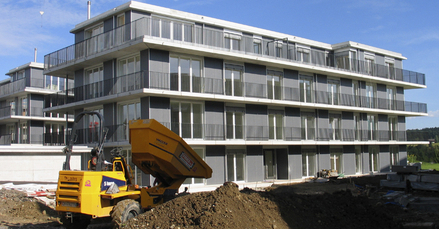The housing market in 2014 showed price and rents “stabilizing at a high level”, suggesting that it is at the top of a real estate cycle, the Federal Housing Office (FHO) said in a summary published on Wednesday.
Construction activity is keeping pace with demand in most regions and the overall vacancy rate is “slightly on the rise” but the office said it was too early to announce an all-clear for Switzerland’s accommodation situation, which has remained tight for several years.
The reported noted there are disparities between regions and various segments of the housing market.
But the net immigration of 80,000 people last year bolstered demand overall, even as other factors dampened costs.
Declining interest rates are helping to lower some rental costs and tougher capital requirements for banks financing homes have kept a lid on prices, the report said.
Rents and property prices are already beginning to dip in the Zurich market, it said.
But “the contrary was observed in the Lake Geneva region”, where there was a sharp increase in the number of households in 2014.
Housing shortages in other regions caused prices to rise slightly, the FHO said.
While long-time tenants benefit from price controls that are tied to interest rates, newcomers face paying rents that are linked to supply and demand.
Landlords are free to raise rents when a new tenant takes over a lease.
The only regions with ‘balanced’ housing markets were in the northwest, the south and the southeast parts of Switzerland, the report said.
Despite the construction of new rental accommodation it said the number of new units overall has failed to keep up with demand stimulated by immigrants.
Rent increases can be expected this year if the number of households continues to increase, it said.
However, if the current economic slowdown leads to a reduction in immigration and a decline in demand from the existing population, “imbalances are likely to decrease in the rental housing market”.
The findings are based on a study by the Zurich University of Applied Sciences and consultants Metas-Sys which said that housing construction has been unable to keep pace with immigration since 2005 leading to a penury of available units and an “enormous rise” in real estate prices, aided by low mortgage rates.
The number of foreign households in 2014 increased 3.1 percent to 669,142 from the previous year, while Swiss households edged up just 0.6 percent to 2.9 million from 2.89 million, said the study.
The research looks at the impact of the free movement of people agreement between Switzerland and the European Union on the housing market.
In the Lake Geneva region, where the greatest number of expat households were found (just over 175,000), prices for residential property soared by more than 45 percent from 2005 to 2104.
Prices increased by more than 46 percent in Zurich and 52.4 percent in Central Switzerland.



 Please whitelist us to continue reading.
Please whitelist us to continue reading.
Member comments